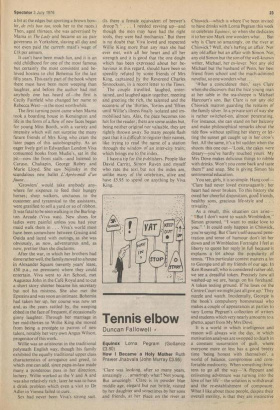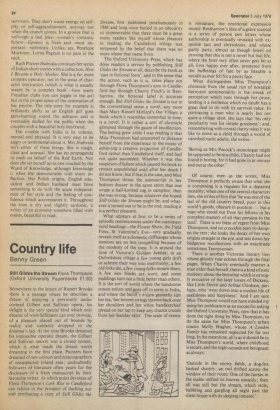Tennis elbow
Duncan Fallowell
Equinox Lorna Pegram (Gollancz £3.80) How I Became a Holy Mother Ruth Prawer Jhabvala (John Murray £3.95) 'Clare was looking, after so many years, amazingly .. . amazingly what ? Not young. But amazingly.' Clare is in powder blue middle age, elegant but not brittle, visited by her daughter and sometimes by her sons and friends, at her place on the river at
Chiswick—which is where I've been invited to have drinks with Lorna Pegram this week to celebrate Equinox, so when she dedicates it to her son Mark one wonders what ... But why is Clare so amazingly, on the river at Chiswick ? Well, she's hating an affair. Not any old affair but an affair with Simon. Not any old Simon but the son of the well-known writer, Michael, her ex-lover. Not any old Michael but the husband of Penn, her best friend from school and the much-admired novelist, so one wonders what ...
What a coincidence then,' says Clare when she discovers that the hice young man at her table in the tea-shoppe is Michael Harcourt's son. But Clare is not any old Chiswick matron guarding the remains of the family silver. In a private sort of way she is rather switched-on, almost penetrating. For instance, she can stand on her balcony and make philosophical remarks about the tide flow without spilling her sherry_ or letting the sunset get caught up in her crow's feet. All the same, it's a bit sudden when she shoots this one out—`Look, the cakes were dreary—you've hardly touched yours. My Mrs Dove makes delicious things to nibble with drinks. Won't you come back and taste them ?' and snap. She is giving Simon his sentimental education.
You see, girls, it is so simple. Hang cool— 'Clare had never loved extravagantly; her heart had never broken. To this history she owed her cheerful disposition, good friends, healthy sons, gracious life-style and . . . triviality.'
As a result, this situation can arise—
But I don't want to watch Wimbledon," Simon groaned, "I want to make love to you." ' It could only happen in Chiswick, you're saying. But Clare's self-assured penetration and sense of humour don't let her down and in Wimbledon Fortnight I feel at liberty to quote her reply in full because it explains a lot about the popularity of tennis. 'This particular contest matters a lot to Georgie and all my friends of our age. In Ken Rosewall, who is considered rather old, we see a dreadful token. Precisely how all washed-up we are, hangs on his forehand. A token testing ground. If he loses on the Centre Court we might just all give up.' They nuzzle and watch. Incidentally, Georgie is the book's compulsory homosexual who makes a couple of appearances at parties to vary Lorna Pegram's collection of writers and students which very nearly amounts to a ghetto, apart from My Mrs Dove.
It is a world in which intelligence and reason will always win the day, in which motivation analyses are swopped to death in a constant susurration of guilt, where everyone more or less has a good breezy time 'being honest with themselves', a world of balance, compromise and comfortable mediocrity. When something threatens to go all the way—`A flippant and enlivening adventure was turning into the love of her life'—the solution is withdrawal and the re-establishment of composure. What I like about these people, despite their overall sterility, is that they are instinctive survivors. They don't waste energy on selfpity or self-aggrandisement, anyway not when the crunch comes. In a groove that is well-nigh a bad joke—women's romantic fiction—Equinox is fresh and—most important— optimistic. Unlike, say, Penelope Mortimer, Lorna Pegram is no pain in the neck.
Ruth Prawer Jhabvala continues her series of Indian short stories with a collection, How I Became a Holy Mother. She is a far more complex operator, not in the sense of character motivation (which is what is usually meant by 'a complex book'—how many Freudian clubs you can juggle in the air) but in the proper sense of the orientation of her psyche. The title story for example is brilliantly shifty as an English girl goes guru-hunting round the ashrams and is eventually deified for the public when she couples with a beautiful holy boyfriend.
The tiouble with India is its volume, mental and physical. It is very easy to be angry or sentimental about it. Mrs Jhabvala isn't either of these things. She is tough, clear and unusual. She has no propaganda to push on behalf of the Red Earth. Nor does she set herself up as one touched by the Wand of Knowledge, although knowledge is what she demonstrates with every inflection. Her Polish origins, English education and Indian husband must have something to do with the acute independence of her style and the feeling of confidence which accompanies it. Throughout the tone is dry and slightly sardonic, a writer of an economy somehow filled with events, beautiful to read.



































 Previous page
Previous page